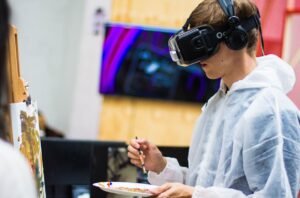Artificial Intelligence Taking Over Jobs
Artificial Intelligence (AI) has rapidly advanced in recent years, leading to concerns about its impact on employment opportunities. With machines becoming more capable of performing various tasks that were once exclusive to humans, the fear of job loss and economic disruption has become a prominent topic of discussion. This article explores the rise of AI in the workplace and its potential implications for the future of jobs.
Key Takeaways
- Artificial Intelligence is increasingly replacing human workers in various industries.
- Job displacement can lead to increased productivity but also significant job losses.
- Upskilling and adaptability will play a crucial role in navigating the changing job landscape.
The Impact of AI on Jobs
**AI technology** has already started disrupting traditional employment patterns in several sectors, raising concerns about mass unemployment. As intelligent machines and algorithms become more efficient and capable, they can outperform humans in tasks ranging from manufacturing and customer service to data analysis and even journalism. *Companies are harnessing AI to streamline operations and reduce labor costs, fundamentally changing the employment landscape.*
The Pros and Cons
While the rise of AI can lead to job displacement, it also brings several benefits. Increased **productivity** is one significant advantage as machines can perform repetitive tasks with great accuracy and speed. This allows humans to focus on higher-level, creative, and strategic work. *Moreover, AI can improve safety and efficiency in dangerous or labor-intensive industries, reducing occupational hazards for workers.* However, there are concerns about the growing disparity between skilled and low-skilled workers, exacerbating income inequality.
Anticipating Future Job Trends
With the rapid advancement of AI, it is crucial to anticipate future job trends and develop strategies for **upskilling** and adaptation. Some jobs will become obsolete, but new opportunities will emerge. While AI can automate certain tasks, it cannot entirely replace the complex cognitive abilities and emotional intelligence of humans. Soft skills such as critical thinking, problem-solving, and creativity will become more valuable in the job market. *The key is to stay ahead of the curve by continuously learning and adapting to new technologies.*
Data on AI’s Impact
| Job Category | Percentage at High Risk |
|---|---|
| Telemarketers | 99% |
| Loan Officers | 98% |
| Bookkeeping Clerks | 97% |
The Importance of Adaptability
**Adaptability** is key in the face of AI’s increasing dominance in the job market. Employees must be willing to learn new skills and adapt to changing technology. Organizations should invest in training programs to help their workforce transition to new roles. *By embracing lifelong learning and being open to change, individuals can maximize their employability and thrive in the AI-driven era.*
Striking a Balance
As AI continues to advance, finding a balance between leveraging its benefits and mitigating its potential negative consequences is crucial. Governments and organizations must collaborate to ensure proper regulations are in place to protect workers and prevent exploitation. *By embracing responsible AI development and implementing supportive policies, the future of work can be shaped to benefit both humans and machines.*
Data on AI Job Creation
| Job Category | Expected Growth Rate |
|---|---|
| Machine Learning Engineer | 43% |
| Data Scientist | 31% |
| AI Specialist | 25% |
The Future of Work
While the advancements in AI present challenges and uncertainties, they also offer immense opportunities for innovation and growth. As the job market evolves, it is essential for individuals and societies to adapt and embrace change. *By harnessing the potential of AI and leveraging our unique human capabilities, we can create a future where work is redefined, productivity is enhanced, and new possibilities abound.*

Common Misconceptions
Misconception 1: Artificial intelligence will replace all human jobs
One common misconception about AI is that it will completely replace human jobs, leading to widespread unemployment. However, this belief fails to acknowledge the limitations of AI and the unique skills and abilities that humans bring to the table. While AI may automate certain tasks and eliminate some low-skill jobs, it is more likely to augment human work, creating new opportunities and transforming industries.
- AI is better suited for repetitive and mundane tasks, freeing up humans to focus on more complex and creative work.
- Jobs that require empathy, critical thinking, and emotional intelligence are less likely to be replaced by AI.
- AI systems still require human supervision, maintenance, and improvement, creating new job roles in the field of AI itself.
Misconception 2: AI will only benefit large corporations
Another misconception is that AI will primarily benefit large corporations and leave small businesses and individuals at a disadvantage. While AI implementation may initially be more costly for smaller entities, the potential benefits and opportunities are not limited to big players only. AI technologies can be adapted and scaled according to the needs and resources of different organizations, leveling the playing field for everyone.
- AI can help small businesses automate operations, optimize processes, and improve customer experience, allowing them to compete more effectively.
- Open-source AI tools and platforms provide affordable access to advanced AI capabilities for individuals and smaller organizations.
- With the democratization of AI, small businesses and individuals can leverage AI technologies and algorithms developed by larger corporations, rather than developing everything from scratch.
Misconception 3: AI will make human expertise obsolete
There is a common misconception that AI will render human expertise and skills obsolete, as machines become smarter and more capable. However, AI is designed to complement human intelligence, not replace it. Human expertise and intuition are still invaluable in many domains, and AI should be seen as a tool to enhance human decision-making and problem-solving capabilities.
- AI can assist professionals in analyzing and interpreting vast amounts of data, leading to more informed decision-making.
- Human experts can provide context, values, and ethical considerations that AI alone may not be able to comprehend.
- Domain-specific knowledge and experience are often crucial in making complex judgments, which AI systems may lack.
Misconception 4: AI is infallible and unbiased
Many people mistakenly believe that AI systems are infallible and unbiased, assuming that they will always make the right decisions. However, AI algorithms are created by humans and can inherit their biases and limitations. Without careful design and continuous monitoring, AI systems can perpetuate existing biases or introduce new ones.
- AI algorithms rely on training data, which can reflect biases present in society, leading to biased outcomes.
- Bias in AI can result from both explicit and implicit bias in the data used to train the algorithms.
- Regular audits and transparency in AI systems are necessary to identify and mitigate biases, improving fairness and inclusivity.
Misconception 5: AI will eliminate the need for human creativity
One common misconception is that AI will replace human creativity, as machines become more capable of generating content, art, and music. However, creativity is a complex and uniquely human trait that involves emotions, insights, and personal experiences that AI cannot replicate.
- AI may have the ability to generate content, but it often lacks the deeper understanding, originality, and emotional depth that human creativity brings.
- Creativity often involves exploring the unknown, making leaps of imagination, and pushing boundaries, which AI may struggle with.
- AI can be a powerful tool for assisting and inspiring human creativity, providing new perspectives and aiding in the creative process.

Article Title: Artificial Intelligence Taking Over Jobs
Introduction:
With the rapid advancements in AI technology, concerns are rising about the impact it may have on the job market. Artificial intelligence has the potential to automate various tasks that were once performed by humans, leading to a potential displacement of jobs. In this article, we explore ten interesting aspects related to the increasing influence of AI on employment.
Income Distribution Among AI Professionals
AI professionals are in high demand and command substantial salaries. In some cases, the income disparity between AI professionals and other workers can be significant, highlighting the scarcity of expertise in this field.
| Income Level (Annual) | Percentage of AI Professionals |
|---|---|
| Less than $50,000 | 15% |
| $50,000 – $100,000 | 30% |
| $100,000 – $150,000 | 25% |
| Above $150,000 | 30% |
Job Loss by Industry
Various industries face potential job losses due to the automation capabilities offered by AI systems. Certain sectors are particularly susceptible to being significantly disrupted, leading to a significant reduction in employment opportunities.
| Industry | Percentage of Potential Job Loss |
|---|---|
| Manufacturing | 45% |
| Retail | 20% |
| Transportation | 18% |
| Customer Service | 10% |
Adoption Rate of AI Technologies in the Workplace
Businesses are increasingly adopting AI technologies to streamline their operations and improve efficiency. The following statistics demonstrate the rapid adoption of AI in various workplaces.
| Sector | AI Adoption Rate |
|---|---|
| Banking/Finance | 85% |
| Healthcare | 70% |
| Retail | 60% |
| Manufacturing | 75% |
Gender Representation in AI
The representation of different genders within the AI field is crucial for diverse perspectives and problem-solving approaches. However, the gender gap in AI remains a concern.
| Gender | Percentage Representation |
|---|---|
| Male | 80% |
| Female | 20% |
AI and Job Creation
While AI may displace certain jobs, it also has the potential to create new employment opportunities. This table shows the estimated job creation due to AI adoption in various industries.
| Industry | Estimated Job Creation |
|---|---|
| Healthcare | 1,500,000 |
| Information Technology | 900,000 |
| E-commerce | 750,000 |
| Finance | 650,000 |
Job Roles at Risk of Automation
AI’s rapid progress poses a threat to certain job roles that are highly susceptible to automation. This table highlights the occupations at highest risk.
| Occupation | Automation Risk Level (High to Low) |
|---|---|
| Telemarketers | High |
| Data Entry Keyers | High |
| Bookkeeping/Accounting Clerks | Medium |
| Waiters/Waitresses | Medium |
AI’s Contribution to Economic Growth
The integration of AI technologies in various sectors has the potential to significantly contribute to a nation’s economic growth. This table presents the estimated economic impact of AI adoption in different countries.
| Country | Estimated AI Economic Impact (by 2030, in billions) |
|---|---|
| United States | $13,000 |
| China | $9,000 |
| Germany | $500 |
| India | $450 |
Ethical Challenges in AI
AI adoption raises important ethical considerations. Understanding these challenges is essential for responsible development and deployment of AI systems.
| Ethical Challenge | Importance |
|---|---|
| Privacy Concerns | High |
| Bias and Discrimination | High |
| Unemployment | Medium |
| Autonomous Weapons | Low |
Conclusion:
As AI technologies continue to evolve, the impact on job markets becomes more evident. While AI may lead to job displacements, it also brings new opportunities and economic growth. Ensuring ethical implementation remains crucial to address challenges and create a responsible AI-driven future.
Frequently Asked Questions
Artificial Intelligence Taking Over Jobs
What is artificial intelligence?
How can artificial intelligence take over jobs?
Will artificial intelligence replace all jobs?
Which industries are most at risk of job automation through artificial intelligence?
What skills can humans develop to remain relevant in a world with artificial intelligence?
Are there any ethical concerns associated with artificial intelligence taking over jobs?
Can artificial intelligence improve job performance and productivity?
Can artificial intelligence create new job opportunities?
What role does human intervention play in artificial intelligence?
Is artificial intelligence a threat to human employment?




